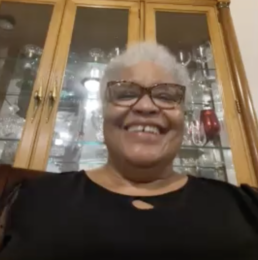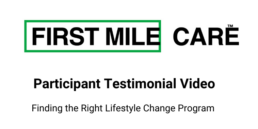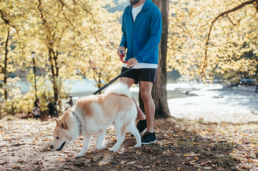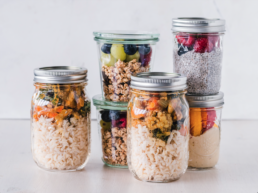By Juliana Ronn, First Mile Care Director of Operations
Olidia Thomas is a 72-year-old widow who lives in Ypsilanti, Michigan, with her two youngest granddaughters. She spent 45 years as a healthcare manager at the University of Michigan in Ann Arbor before her retirement. She has been in the year-long First Mile Care Diabetes Prevention Program (DPP) for seven months.

1. Olidia, Were you concerned about prediabetes before joining the First Mile Care Diabetes Prevention Program?
Minimally. I had heard the term at my job and knew about prediabetes monitoring but didn’t really think it applied to me. Nobody ever does, right? There isn’t a history of diabetes in my family, although hypertension is common. I take medication for high blood pressure.
My physician, Dr. William Chavey of Emmaus Health Partners, did talk to me for a couple of years about my need to lose weight. He was concerned that my blood glucose put me in the prediabetes range. I have some friends who have type 2 diabetes and must take shots or pills, and I certainly didn’t want to let myself get to that point. So, when I got a letter from Coach Taylor Winkel of First Mile Care saying that Dr. Chavey had recommended me as a candidate for the diabetes prevention program, I was ready to try it.
2. Have you tried any weight loss or lifestyle change programs in the past?
Oh sure, I have paid memberships in several weight loss programs and gyms in the past. I’ve gained weight and lost it and gained it all back again. I wasn’t consistent with any of it and would get discouraged and give up. For example, Weight Watchers didn’t work for me as I had to deny myself too many of the things I really liked. I tried to game the system by starving myself just before the weigh-ins. The thing was, I was focused solely on the short-term goal of losing pounds rather than on making the long-term behavioral changes that would result in weight loss.
3. You’ve been in the First Mile Care DPP for about seven months. What results have you seen so far?
Yes, I’ve already lasted longer in First Mile Care DPP than in any other program I’ve tried. And that’s because I’ve made a firm commitment to myself to stay on course. In addition, the changes are fairly easy to make, and I can see the effects. My doctor was really impressed with my progress at my checkup.
- I feel better. I don’t feel sluggish. That’s a significant improvement for me.
- My A1C has fallen from 5.7 two years ago to 5.2. My doctor said it’s now “better than normal” and no longer in the range for prediabetes.
- I’ve lost 32 pounds so far. My long-term goal is to lose about 90 pounds, even though I may not be able to lose all that by the time I finish the First Mile Care program in the fall. Instead, I’m focusing on achieving short-term goals of 20 pounds, and then will reset my goals. My doctor says this is my lowest weight in four years.
- I can feel the change in my clothes, especially on my bottom half. My clothes feel loose and comfortable. A belt that used to be so tight I couldn’t wear it, is now loose enough that I use the second notch from the end.
4. Why do you think the First Mile Care program is working for you when others haven’t?
I have a positive mindset and commitment to the program. I follow the suggestions that my coach makes. It’s not just about denying myself food but about setting goals, looking at what I eat, counting calories, increasing water intake, increasing fruits and vegetables, looking at portion sizes, and getting more exercise.
I found that keeping a food journal and tracking my intake is helpful. It’s not onerous to do it. I still eat the things I love, like ham, in moderation. I just keep track of the calories and try to stay within the guidelines. Even when I went on a vacation with friends recently, I packed healthy snacks, cooked in the resort kitchenette, and was more conscious of staying active and eating balanced meals. Most importantly, I forgive myself when I go off course.
5. What has been the most helpful thing that you’ve learned in the First Mile Care program?
My entire relationship with food is changing. I used to eat whatever I wanted and as much as I wanted, without thinking about it. Now I eat mindfully. I look at the calorie counts, and especially at the portion sizes. I’m not only eating more fruits and vegetables; I’m adding more variety. I used to eat a lot of fast food, especially pizza, but have cut way back. My whole way of eating is changing!
6. What are some of the specific changes you have made?
Oh, there are so many!
- Portions and servings. I pay attention to portion size and eat smaller amounts. I even bought little serving trays to use for preparing my weekly meals.
- Meal prep. I am trying new ways of preparing my food and recently bought an air fryer. For example, I love fried chicken but now put it on the grill or the air fryer instead of traditional frying. I fixed some sweet potato fries in the air fryer, and they were delicious! Now I’m trying to get used to the taste of olive oil as I know it’s healthier.
- Shopping. I plan my week’s meals before I go to the store so that I don’t buy things on impulse that aren’t healthy. I avoid buying soda pop and other things, like candy, that I know I’ll find hard to resist if I have them in the house.
- Nighttime snacking. I’m a night owl and sometimes snack late at night, but now I eat carrots and celery at Coach Taylor’s suggestion.
- Restaurant dining. I’m of the generation that doesn’t believe in wasting food. At my coach’s suggestion, I now always ask for a to-go container at the start of the meal and put half my food away. I can still eat at my favorite Olive Garden but split my serving into two meals.
- Exercise. I was never consistent at exercise, but now I always meet or exceed the recommended minimum of 150 minutes of weekly moderate exercise. I follow YouTube exercise videos for seniors, bought resistance bands for at-home strength training, and just got a FitBit to track my steps and blood pressure.
7. What role has your coach played in your success?
Coach Taylor is very motivating and encouraging – a real cheerleader when it comes to keeping everyone in the group on track towards their goals. When someone falls off the wagon, so to speak, she encourages us to get on again. She has made suggestions that I hadn’t thought of before, like doing short sprints of exercise during TV commercials. I have stopped watching TV in bed so that it’s easier to get up and move about. She’s made me aware that every little bit of movement counts towards my activity goal.
8. First Mile Care emphasizes neighborhood-based groups that pull participants from the same ZIP codes. How has being in a group helped you?
The group is helpful both in terms of accountability and motivation. You want to be able to tell people each week about your progress and get bragging rights and congratulations. But it’s also helpful to swap stories about our struggles. I feel less discouraged if I know that other people also fall behind in meeting their goals, yet can get back on track.
We also share tips and recipes and information on where to go shopping. For example, one of the women in my group suggested juicing, so now I make that into my own tea. I never used to like tea but am trying it as a substitute for soda pop, so my granddaughter and I have boiled apple, lemon, and pineapple peels for tea.
9. How do you expect to maintain the progress you have made in changing your lifestyle?
This is the longest I’ve stuck with a lifestyle change program. Knowing I can fall off the wagon and get back on is important. It’s not the end of the world. It’s not the end of the program. I plan to keep monitoring what I eat, setting up meal plans, eating more vegetables, drinking more water, and getting my minimum 150 minutes a week of exercise. One recommendation in the program is to get your family members involved so that they can support you. I’ve got my grandchildren to remind me that “you said you weren’t going to eat that.” If I ask my granddaughter to buy me a candy bar now, she won’t!
10. What advice do you have for people who join a lifestyle intervention program like First Mile Care?
You have to be committed. You have to make up your mind that you really want to follow the program, but also recognize that there will be times that you may not be able to stick to it. Set your goals in increments so that you can achieve small successes as you work towards them. Allow yourself to backslide at times. The important thing is that you don’t give up! It’s worth the effort. The finish line is attainable.
To learn more about how you can benefit from the First Mile Care Diabetes Prevention Program, take the prediabetes risk test and get started today!









